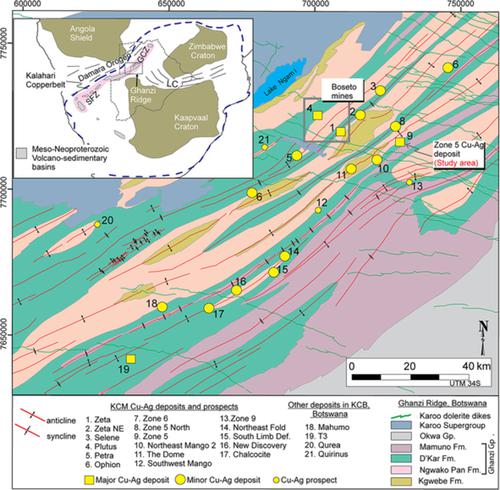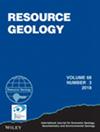博茨瓦纳西北部喀拉哈里铜矿带Khoemacau第5带铜银成矿作用的成岩和表观成因
IF 0.8
4区 地球科学
Q3 GEOLOGY
引用次数: 1
摘要
在喀拉哈里铜带,区域尺度的铜银成矿机制在早期成岩作用和区域变形过程中的单道作用之间一直存在激烈的争论。在博茨瓦纳西北部的5区铜银矿床中,矿体优先赋存于化学还原的变质沉积岩中,这些变质沉积岩是过度氧化的含赤铁矿的黑砂岩。发现了一个早期成岩成矿事件,其特征是细粒层状黄铁矿,包括再结晶的草莓状黄铁矿,与寄主岩中的成岩矿物组合共生。成岩黄铁矿与黄铜矿、闪锌矿、方铅矿和(Fe - Co - Ni)硫化物处于结构平衡。这些矿物随后被与达玛兰造山运动(~ 600-480 Ma)有关的更强烈的、多阶段的、受构造控制的热液铜银成矿事件所覆盖。热液铜银成矿作用来源于高温(~236 ~ 265℃)、高矿化度(19 ~ 24.6 wt% NaCl当量)的热液矿液。岩石学结果显示,两次矿化事件之间的微量金属组合(Cu、Fe、As、Zn、Pb、Ni、Co)明显重叠,这可以用前驱体硫化物的再活化来解释。矿石中主要的银载体为辉铜矿、钴矿和斑铜矿。成岩黄铁矿的δ34S值为−35.8 ~ +11.4‰,热液表成硫化物(包括黄铁矿)的δ34S值为−28.0 ~ +3.0‰。我们认为热液硫化物从早期形成的矿物中获得了一些细菌还原的硫。与热液成矿有关的石英和方解石的δ18O和δ13C值是新元古代沉积型铜银矿床的典型特征。方解石脉石的δ18O同位素值异常贫化,可能是变质条件下的再结晶所致。我们在第5带的研究表明,第5带的铜银矿床是一个多阶段成矿历史的结果,包括成岩和表观成因事件(间断>400 m.y),在强烈的岩性-构造控制下促进了成矿作用。本文章由计算机程序翻译,如有差异,请以英文原文为准。

Diagenetic and epigenetic origins for Cu‐Ag mineralization in the Khoemacau Zone 5 deposit, Kalahari Copperbelt, northwestern Botswana
In the Kalahari Copperbelt, the mechanism of regional scale Cu‐Ag mineralization has remained intensely debated between early diagenesis and a single pass during a regional deformation event. At the Zone 5 Cu‐Ag deposit in northwestern Botswana, the orebody is hosted preferentially by chemically reduced metasedimentary rocks that overly oxidized, hematite‐bearing arkosic sandstone. An early diagenetic mineralizing event has been identified which is characterized by fine‐grained stratiform pyrite, including recrystallized framboidal pyrite, intergrown with diagenetic mineral assemblages in the host‐rock. Diagenetic pyrite is in textural equilibrium with chalcopyrite, sphalerite, galena, and (Fe‐Co‐Ni) sulfarsenide. These minerals were subsequently overprinted by a more intense, multi‐stage, structurally‐controlled hydrothermal Cu‐Ag mineralization event related to the Damaran orogeny (~600–480 Ma). The hydrothermal Cu‐Ag mineralization was deposited from hot (~236–265°C), high salinity (19–24.6 wt% NaCl equiv.) hydrothermal ore fluids. Petrographic results reveal an apparent overlap in trace metal associations (Cu, Fe, As, Zn, Pb, Ni, Co) between the two mineralizing events, which can be explained by remobilization of precursor sulfides. The major Ag‐carriers in the ore are chalcocite, covellite, and bornite. The δ34S values of diagenetic pyrite range from −35.8 to +11.4‰, whereas those of hydrothermal epigenetic sulfides, including pyrite, range from −28.0 to +3.0‰. We propose that the hydrothermal sulfides had acquired some bacterially‐reduced sulfur from earlier‐formed minerals. The δ18O and δ13C values of quartz and calcite associated with the hydrothermal mineralization are typical of Neoproterozoic sediment‐hosted Cu‐Ag deposits. However, the δ18O isotopic values of the calcite gangue are anomalously depleted, which is likely due to recrystallization under metamorphic conditions. Our studies at Zone 5 indicate that the Zone 5 Cu‐Ag deposit is the result of a multi‐stage mineralization history that includes both diagenetic and epigenetic events (punctuated by >400 m.y.) facilitated by a strong litho‐structural control.
求助全文
通过发布文献求助,成功后即可免费获取论文全文。
去求助
来源期刊

Resource Geology
地学-地质学
CiteScore
2.30
自引率
14.30%
发文量
18
审稿时长
12 months
期刊介绍:
Resource Geology is an international journal focusing on economic geology, geochemistry and environmental geology. Its purpose is to contribute to the promotion of earth sciences related to metallic and non-metallic mineral deposits mainly in Asia, Oceania and the Circum-Pacific region, although other parts of the world are also considered.
Launched in 1998 by the Society for Resource Geology, the journal is published quarterly in English, making it more accessible to the international geological community. The journal publishes high quality papers of interest to those engaged in research and exploration of mineral deposits.
 求助内容:
求助内容: 应助结果提醒方式:
应助结果提醒方式:


